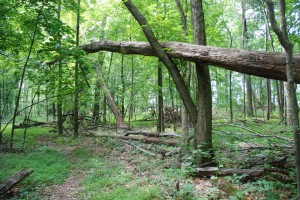NO: THERE IS NO BALANCE OF NATURE, BUT WE KEEP ACTING AS IF THERE WAS.

It is common to believe that nature --- our entire environment ---is constant, as long as people stay out of the way. But as an ecologist with more than 40 years’ experience in research, I have studied every aspect of our environment. And it is clear that there is no balance of nature. Everything is always changing ---wildlife populations, forests, the oceans, climate.
People give lip service to the idea that nature may not be constant, but when it comes to passing laws, setting down policies, giving advice, and deciding what to do, most of the time we act as if nature was balanced --- constant. That is, as long as we stay out of the way.
Cases in Point:
- With the wildfire season approaching --- actually already here in southern California, we are still often told to follow Smokey Bear's advice: Only you can prevent forest fires. And therefore all forest fires are bad. But it has been shown widely that many, even most, forest species require fire for long-term survival. Even giant redwood and sequoia trees can only reproduce when there are light fires. To sustain forests, we have to allow and even promote the kind of frequent, light fires that do no permanent damage, are easily controlled, and do not burn down houses.
- Some scientists, pundits, politicians tell us we are destabilizing the climate. But all the evidence, going back hundreds of thousands --- many millions of years--- makes clear that the climate is always changing. Something that is always changing is not stable, so you can "destabilize" it.
- Overall, Earth's climate has been warming since the end of the last ice age, 12,500 years ago. Sea level has been rising naturally. We may be speeding up the rate of sea level rise, but it was happening, and building right on an ocean beach has always carried risks.
- Fish of commercial value are managed --- by laws and regulations --- as if unharvested by people, their populations would become constant. But again, without human influence, fish populations have always varied over time.
- Our national laws and international treatises to save the great whales assume that without people catching whales their populations would be constant forever. But whale populations fluctuate too.
I first wrote about this in 1990 in my book Discordant Harmonies: A New Ecology for the 21st Century. In that book I reviewed all the scientific information I could find about all aspects of environment, and showed that nature was always changing, but that laws policies and actions assumed a balance of nature. I had hoped that this would lead to a change in thinking, laws, and policies. It has had some effect, but today, almost a quarter of a century later, the balance of nature idea is alive and well and still at the basis of many actions.
As a result, it was clear to me that the point had to be made again, updated with modern scientific findings and recent laws, policies, and actions. So in 2012 I published The Moon in the Nautilus Shell: Discordant Harmonies Reconsidered. In part this is an update, but more important it broadens the discussion in many ways, especially about how we, as individuals, can better understand and help our environment. If you want to find out what nature is really like, what kinds of changes are natural, from endangered species to climate, you might like to read this new book.
What can an ordinary citizen do to help sustain what we like and want about the environment? Part of our problem is that nature for many of us has become an abstraction, something we don't really know about, don't have contact with, but hear and read a lot of statements made by pundits, politicians, and the media. How to correct that is the subject of my next essay about the imbalance of nature.

Leave a Reply